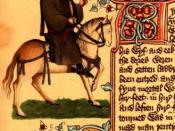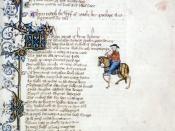Since the beginning of time women have fought against the oppression and prejudices facing them. Geoffrey Chaucer is one who berates the status and tendencies of women, consistently reinforcing the judgment that females are the root of all evil. Chaucer uses his work The Canterbury Tales, to criticize the female persona.
The Wife of Bath's Tale is a prime example of Chaucer's predilection on the status and standing of women in society during his time:
I would no longer stay in the bed
if I felt my husband's arm over my side
until he paid his ransom to me;
then I would allow him to do his bit of business.
Therefore I tell this moral to everyone-
profit whoever may, for all is for sale:
you cannot lure a hawk with an empty hand;
for profit I would endure all his lust;
and pretend to have an appetite myself; (201)
It is incredibly inaccurate to say that this tale is empowering to women.
How can it be empowering when the female protagonist is basically preaching to other women that it is okay to act like a harlot as long as it is for your benefit? Critics can make the claim that The Wife of Bath comes across as an independent women, but it is only through her shallow, pompous nature that she obtains this status as seemingly independent. Chaucer uses this attitude to diminish The Wife of Bath, as well as women as a whole, in the reader's eyes. The Wife of Bath encourages the reader, also all women, to do things only for one's own good, even in a relationship as sanctimonious as marriage. The Wife of Bath does not attempt to establish herself as an equal, but instead sends the message that it is okay for women...


